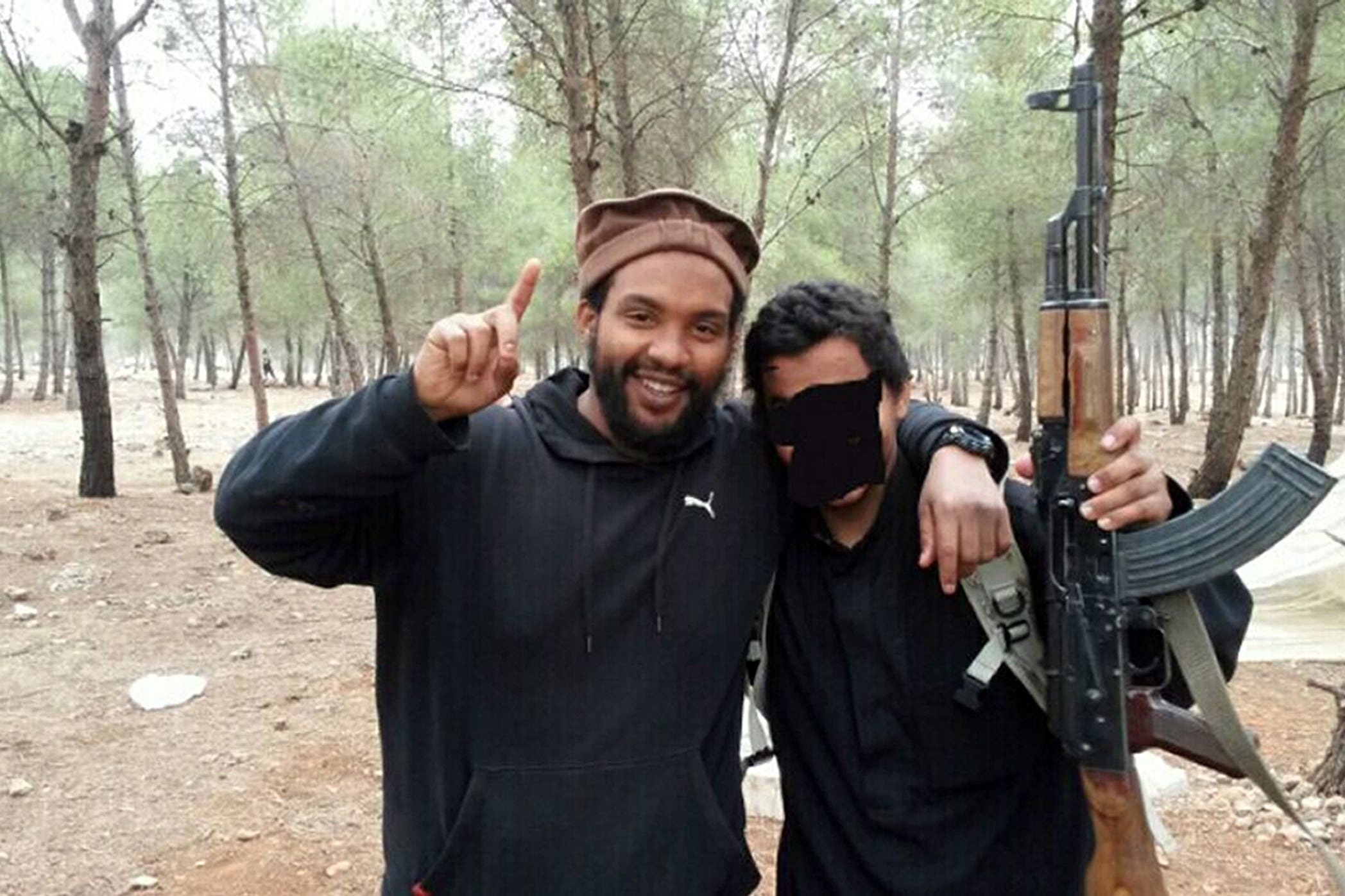Suspected ‘Beatles’ death squad member jailed for terror offences
Aine Leslie Davis, 39, was deported from Turkey last August.

A British Muslim convert suspected of being a member of the so-called Islamic State death squad dubbed The Beatles has been jailed for eight years.
Aine Leslie Davis, 39, was deported from Turkey last August and detained on arrival at Luton Airport after serving a seven-and-a-half-year sentence for membership of IS.
Last month, he admitted possession of a firearm contrary to Section 57 of the Terrorism Act 2000, and two charges of funding terrorism, after the Court of Appeal threw out a bid for the charges to be dropped.
The charges, dating back to 2013 and 2014, related to images with Davis’s then-wife while he was in Syria and a failed bid to send him 20,000 euro via an unwitting courier.
Davis has always denied being connected with The Beatles cell – so-called because of their British accents – which tortured and beheaded Western hostages in Syria.
Two IS Beatles members, British nationals El Shafee Elsheikh and Alexanda Kotey, are serving life in US jails.
The third Beatle, Mohammed Emwazi, dubbed Jihadi John, who was believed to feature in shocking videos of IS beheadings of a number of captives, was killed in a drone strike in 2015.
Davis’s legal team had claimed that US authorities had accepted there was no fourth Beatle, while the Court of Appeal noted any plan to extradite him there was “short-lived and discounted”.
Making no reference to the Beatles, Mark Summers KC issued an apology to the Syrian people on Davis’s behalf saying the defendant and those like him “did more harm than good”.
Mr Summers said: “The reality he found when he arrived in Syria was profoundly different to anything he had ever imagined. What he thought he could achieve personally in a war zone transpired to be wholly and completely naive.
“Very little involved helping people of Syria. It involved most of the time in-fighting and schisms.”
Having “misunderstood” his religious obligations to travel to Syria, Davis left in January 2014 having witnessed “atrocities” and achieved nothing significant, he said.
Mr Summers said: “He has a number of apologies to make through me today – the first is to the Syrian people. The presence of him, those like him and the groups he associated with there, caused more harm than good.”
In a televised sentencing at the Old Bailey on Monday, Judge Mark Lucraft KC jailed Davis for five and a half years for the firearms offence and two and a half for terrorism funding, to run consecutively.
The judge told him: “From the messages and images you sent to your wife it is clear you have been with fighters in Syria and that you were not there for lawful purposes. There are images of you in possession of firearms in November 2013.”
Referring to the widely reported allegations for which Davis was not charged, the judge added: “It is submitted on your behalf that there is much that has been said about you in the media and elsewhere that is not supported by evidence before the court.
“I make it clear I am sentencing you for the offences on the indictment and for nothing else.”
Judge Lucraft found Davis was not a dangerous offender, having taken into account the “passage of time” since he was in Syria.
However, Davis was told he will have to serve his entire custodial sentence and will be on licence for a further two years upon his release.
Davis’s terrorist activities dated back to 2013 when he left his home in London and set off to join the armed conflict in Syria, having previously converted to Islam and spent time in the Middle East.
The evidence was largely uncovered from his communications with his then-wife, mother-of-two Amal El-Wahabi, 36, who stayed behind in north London, living on benefits.
He went on to enlist her in a plan to send him cash by hoodwinking her friend Nawal Masaad, 36, to act as courier on the promise of 1,000 euro.
Ms Masaad, from Holloway, north London, was stopped at Heathrow Airport on January 16 2014 as she was about to board a flight to Istanbul with 20,000 euro stuffed inside her tights.
The prosecution alleged the money, raised in the UK, was destined to support Davis’s terrorist cause in Syria.
Following El-Wahabi’s arrest in London, police uncovered a stash of terrorist propaganda said to have been left behind by Davis when he went to Syria.
On her mobile phone was a picture sent by Davis in November 2013 in Syrian woods with a man holding a Kalashnikov rifle.
Davis told his wife: “Don’t show this to anyone but yuyu. (sic). I mean it.”
He sent another picture posing with 13 others in military-style clothes and holding up guns.
Asked by El-Wahabi if he was doing anything exciting, Davis said he was just “on point”, which is believed to be a reference to guard duty.
The court heard it was clear that Davis – who had convictions for possession of drugs and gun possession – had gone to Syria to fight under the black flag of IS and that he was preoccupied with martyrdom.
After the Old Bailey trial in 2014, El-Wahabi became the first person to be found guilty of funding terrorism in Syria and was jailed for 28 months, while Ms Masaad was cleared of wrongdoing.
In November 2015, Davis was arrested with others in Istanbul after being found using a forged travel document and later jailed for IS membership.
After his return to the UK, Davis pleaded guilty to the terrorism offences at the Old Bailey after a last-ditch attempt to throw out the case was rejected by Judge Lucraft and the Court of Appeal.
The Court of Appeal rejected a claim by Davis’s defence barrister that he could not be tried twice for the same crime, finding the offences were different.
Also rejected was a claim British authorities “connived” with Turkish counterparts in a failed bid by the then-home secretary Priti Patel to arrange his onward extradition to the US where the two other IS Beatles were tried.
Davis’s barrister, Mark Summers KC, had claimed lawyers in the US were not seeking to bring a prosecution against Davis “because the evidence was there were only three members and not four members of that cell”.
The Court of Appeal ruling stated there was “a wholesale lack of evidence of misconduct on the part of the then-home secretary and the relevant United Kingdom officials”.
The senior judges added that the plan to prosecute Davis in the US was “irrelevant to his alleged unlawful deportation” and any discussions about it were “no more than a footnote in the history of the return of the applicant to the United Kingdom”.
Nick Price, from the Crown Prosecution Service, said: “Davis left the UK and travelled to Syria to involve himself with a proscribed terrorist organisation.
“While in Syria, he was able to call upon an associate or a network of likeminded individuals to arrange and deliver 20,000 euro to his wife, which was due to be taken to the country.
“It is only right he has been convicted and imprisoned in this country.”
